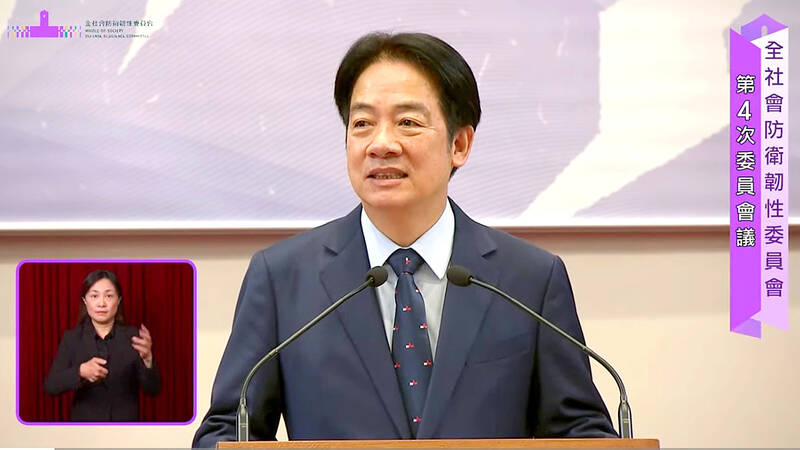Next month would be “national unity month” to showcase Taiwan’s resolve amid high military tensions and fears of war across the Taiwan Strait, President William Lai (賴清德) said yesterday.
All Taiwanese must play their part in civil defense to ensure preparedness and unity, Lai said at the fourth meeting of the Whole-of-Society Defense Resilience Committee at the Presidential Office in Taipei.
The administration plans to hold the 41st annual Han Kuang exercises — the largest ever — and the first-ever urban resilience drills concurrently next month, he said.

Photo: Screen grab from a Presidential Office Web cast
The armed forces would hone their operational capabilities during the military drills, while civilians would practice civil defense in the resilience exercises, he said.
The resilience exercises would test the ability of local governments to mount a joint response across jurisdictions, as well as alongside the armed forces, during a contingency, Lai said.
The exercises would allow the nation to display its resolve to defend itself against aggressors and boost the resilience of society as a whole, he said.
The military in the past few years has shown its commitment to realistic training scenarios necessary to attain asymmetric warfare proficiency, bringing about the national strategy of resolute defense and multi-domain deterrence, he said.
The Han Kuang exercises are scheduled for 10 days from July 9 to 18, focusing on training troops as they would fight in a genuine conflict, he said.
The capabilities to be tested include responding to “gray zone” activities, rapid deployment in reaction to a military crisis and maintaining communication channels, he said.
They also include regenerating combat forces by using reservists, weapons familiarization, logistics and military-civil cooperation, Lai said.
The government since April has been conducting urban resilience exercises in Lienchiang, Hualien, Taitung, Penghu and Kinmen counties, as well as in Chiayi, Hsinchu and Keelung, he said.
From July 15 to 17, drills are to be conducted in Taichung, Tainan and Taipei at locations designated as key infrastructure, with distribution points for essential goods and first aid stations being established nearby, he said.
Some PX Mart Co (全聯實業) supermarkets would take part in the exercises, Lai said.
Simultaneously, all 22 counties and special municipalities are to conduct air raid and civil defense drills, he said.
The responsibility to defend the nation does not rest solely on the shoulders of the armed forces. Police officers, healthcare workers, civil officials, private enterprises and ordinary citizens all have a role to play, he said.
Taiwanese should develop a mental habit of preparing for disaster and other contingencies, Lai said.
The broad participation of Taiwanese in the drills is necessary to cultivate the nation’s collective mental preparedness to remain calm, effective and unified while facing a crisis, he said.
The Executive Yuan has proposed a special NT$410 billion (US$14.06 billion) budget to enhance national security and resilience, including NT$150 billion dedicated to homeland defense capabilities, he said.

NATIONAL SECURITY THREAT: An official said that Guan Guan’s comments had gone beyond the threshold of free speech, as she advocated for the destruction of the ROC China-born media influencer Guan Guan’s (關關) residency permit has been revoked for repeatedly posting pro-China content that threatens national security, the National Immigration Agency said yesterday. Guan Guan has said many controversial things in her videos posted to Douyin (抖音), including “the red flag will soon be painted all over Taiwan” and “Taiwan is an inseparable part of China,” while expressing hope for expedited “reunification.” The agency received multiple reports alleging that Guan Guan had advocated for armed reunification last year. After investigating, the agency last month issued a notice requiring her to appear and account for her actions. Guan Guan appeared as required,

Japan and the Philippines yesterday signed a defense pact that would allow the tax-free provision of ammunition, fuel, food and other necessities when their forces stage joint training to boost deterrence against China’s growing aggression in the region and to bolster their preparation for natural disasters. Japan has faced increasing political, trade and security tensions with China, which was angered by Japanese Prime Minister Sanae Takaichi’s remark that a Chinese attack on Taiwan would be a survival-threatening situation for Japan, triggering a military response. Japan and the Philippines have also had separate territorial conflicts with Beijing in the East and South China

A strong cold air mass is expected to arrive tonight, bringing a change in weather and a drop in temperature, the Central Weather Administration (CWA) said. The coldest time would be early on Thursday morning, with temperatures in some areas dipping as low as 8°C, it said. Daytime highs yesterday were 22°C to 24°C in northern and eastern Taiwan, and about 25°C to 28°C in the central and southern regions, it said. However, nighttime lows would dip to about 15°C to 16°C in central and northern Taiwan as well as the northeast, and 17°C to 19°C elsewhere, it said. Tropical Storm Nokaen, currently

PAPERS, PLEASE: The gang exploited the high value of the passports, selling them at inflated prices to Chinese buyers, who would treat them as ‘invisibility cloaks’ The Yilan District Court has handed four members of a syndicate prison terms ranging from one year and two months to two years and two months for their involvement in a scheme to purchase Taiwanese passports and resell them abroad at a massive markup. A Chinese human smuggling syndicate purchased Taiwanese passports through local criminal networks, exploiting the passports’ visa-free travel privileges to turn a profit of more than 20 times the original price, the court said. Such criminal organizations enable people to impersonate Taiwanese when entering and exiting Taiwan and other countries, undermining social order and the credibility of the nation’s